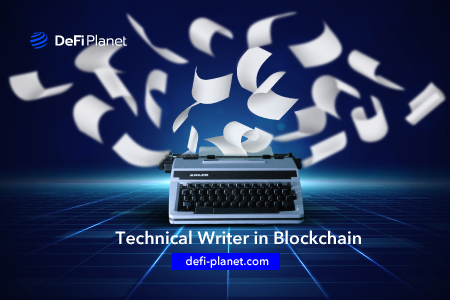Last updated on July 29th, 2023 at 08:11 am
When considering careers in the blockchain industry, the majority of individuals often immediately think about working as software developers. This perception is understandable, given that blockchain companies primarily focus on creating software-based products such as decentralized or centralized exchanges, NFT marketplaces, Layer 1 and Layer 2 protocols, and more. Nevertheless, it is important to recognize that the success of these products extends beyond mere code.
In fact, there are various non-coding roles that significantly contribute to the success of blockchain companies. One such role is that of a blockchain technical writer. Interestingly, this position does not require coding skills to excel at the job. Yet, the fact that individuals in this role can earn salaries of up to $109,000 per annum underscores their importance to a blockchain company’s achievements.
The increasing demand for their skills further exemplifies the importance of blockchain technical writers. In the United States alone, the demand for technical writers is projected to increase by 6% from 2021 to 2031, surpassing the average growth rate for other occupations.

If you are considering a career in blockchain, technical writing is one option you can consider.
This article is a comprehensive guide to what you need to become a blockchain technical writer. It contains insights into the responsibilities and skills needed to excel in this exciting and rapidly evolving domain.
Who Is a Blockchain Technical Writer?
A blockchain technical writer can be described as someone who creates clear and understandable content to facilitate the use of blockchain-based products. They are responsible for producing how-tos, instructional manuals, and documentation that guide users in utilizing specific features or functionalities of a product.

For instance, a technical writer in a decentralized exchange (DEX) may be required to draft a guide on how to use special features like yield farming operations on the protocol. This guide would help the DEX users to use the feature whenever they want to.
However, the role of a technical writer extends beyond creating user guides. They often create content for internal use within the organization. This can involve creating documentation for developers to assist them with new upgrades or other technical requirements.
In smaller organizations and startups, the responsibilities of a technical writer may also include non-technical writing, such as writing review articles that may not contain technical information.
Essentially, blockchain technical writers act as intermediaries between the technical aspects of a blockchain product or company and the non-technical aspect: the end-users.
The success of a blockchain technical writer hinges on their capability to create content that effectively meets the needs of their target audience. They must be able to simplify complex blockchain concepts and communicate them in a manner that is easily understandable for non-technical users.
What Does a Blockchain Technical Writer Do?
The typical tasks and responsibilities of a blockchain technical writer include:
- Creating guides and technical documentation.
- Researching and analyzing technical information.
- Managing and updating technical documents.
- Participating in or coordinating cross-functional teams involving developers, subject matter experts, project managers, and other stakeholders.
The core responsibility of a blockchain technical writer is to communicate technical information to two primary audiences: technical and non-technical users. They will often be asked to write, edit, and publish technical documentation that serves as a guide or reference for the technical audience.
Simultaneously, they must simplify the project’s use cases into easily understandable formats for non-technical users.
Consequently, technical writers will produce various types of documents, including how-tos, tutorials, troubleshooting guides, whitepapers, and FAQs.
While coding skills are not mandatory for blockchain technical writers, having knowledge of coding can facilitate their work, particularly when creating content related to implementing specific codes.
It gives them a deeper understanding of the technical aspects because they have “walked the walk” themselves. Additionally, technical writers should be receptive to criticism and possess a can-do attitude, always willing to learn and expand their knowledge base.
How To Become a Blockchain Technical Writer
Becoming a blockchain technical writer doesn’t follow a strict, linear path. Regardless of your educational background, you can work towards becoming a proficient blockchain technical writer by following these key steps:
1. Gain a Basic Understanding of Blockchain:
To succeed as a blockchain technical writer, it is essential to have a fundamental understanding of the blockchain industry. Technical writing in the blockchain field involves not only writing for end-users but also catering to developers who possess a deeper understanding of the industry.
Familiarize yourself with concepts such as Layer 1 and Layer 2 solutions, smart contracts, and the workings of public blockchains like Ethereum. However, you don’t stop there. Continuous learning is crucial. Take courses and seek opportunities to update your knowledge when you find them.
Platforms like Alison and Blockchain Council provide learning opportunities for anyone interested in blockchain technology. You should check them out.
2. Develop Your Writing and Research Skills:
The easiest way to develop your writing skills as a blockchain technical writer is to start writing. Unless you’re an English major or consistently put out written content, chances are your writing is less effective than you think. But it’s no problem. You don’t need to be a writing guru to work in the blockchain industry, but you’ll need the skillset to serve your audience with easy-to-use-&-understand content.
You will also need quality research skills to excel in your role. Sometimes, this may depend on the position of the technical writer in the organization that they work for, but a technical writer is often tasked with gathering information and analyzing them.
3. Learn How to Create Technical Documentation:
Learning to create technical documentation is different from knowing how to write. Although technical writers are likely to double as content writers in a blockchain startup, their roles are completely different. Technical writing is more detailed and explanatory than general writing.
Taking courses in technical writing will provide you with the necessary knowledge and techniques to create detailed and explanatory technical documents. These courses will expose you to the industry-standard approach to creating technical documents and can enhance your technical writing skills.
4. Choose a Niche:
To find success as a technical writer, you need to make sure that you’re not lost in the wild-west of the blockchain industry. There are various fields, products, and intersections in the blockchain industry; you will need to select a niche in which you will specialize.
Decide whether you want to write technical documents for decentralized applications (dApps), blockchain applications in supply and logistics, or any other specific area that piques your interest.
Then, start with writing how-to guides and gradually progress to more complex and technical documents, like whitepapers. Doing this will allow you to grow progressively in your chosen niche.
5. Build a Portfolio:
Create a portfolio showcasing your best work as a blockchain technical writer. Your portfolio serves as evidence of your capabilities to potential employers or clients.
Platforms like Medium and Substack offer free publishing options where you can showcase your writing skills. A strong portfolio should include samples of your work, contact information, and a brief introduction about yourself.
6. Network with Industry Professionals:
Being part of a community of blockchain enthusiasts keeps you abreast of available opportunities in the industry. Because the companies in the blockchain industry mostly operate a not-so-stringent management structure compared to traditional industries, you may just be in the same community chatting with the CEO of a blockchain startup.
You can also build good connections by staying active in social media blockchain communities. Attending blockchain-themed conferences and meetups is another way to meet people in the blockchain industry.
Engaging with others in the industry not only expands your network, it also broadens your knowledge and understanding of the blockchain field.
7. Put Yourself Out There:
To gain visibility and credibility as a blockchain technical writer, you must actively share your work. Utilize social media platforms to promote your content and engage with relevant communities. Platforms like Hackernoon cater to web3-focused content and offer opportunities to publish technical documents.
You can also volunteer or freelance for blockchain companies. It will help you increase exposure and gain experience.
8. Stay Up-to-Date with the Blockchain Industry:
The blockchain industry evolves rapidly, and as a blockchain technical writer, you must stay informed about the latest developments. Keeping up-to-date allows you to maintain the relevance of your work.
CAVEAT!
The steps above will, however, continue over time and happen in parallel. They should not be treated as chronological steps that are put to bed after landing a role as a technical writer. For instance, working as a blockchain technical writer does not mean you stop networking with other industry professionals. Similarly, a basic understanding of the blockchain industry may not be enough to get you through your career, as your work will require more from you as you progress.
Becoming a blockchain technical writer is building a career in blockchain and web3, and if you don’t know, it doesn’t typically follow the traditional career ladder concept.
Blockchain Technical Writing FAQs
Do Blockchain Technical Writers Need to Learn Programming?
No, blockchain technical writers generally do not need coding skills to excel in their role. However, some technical writers may be required to create code documentation or API reference guides. Having knowledge of basic programming languages such as Solidity and Javascript can be beneficial in these cases.
Where Can Blockchain Technical Writers Work?
Blockchain technical writers can work with companies that offer blockchain-related products and services. Whether it’s a company providing tools for developers or a metaverse project, blockchain companies need professionals who can translate the intricacies of their offerings into easily readable content.
Are Blockchain Technical Writers in High Demand?
Yes, there is a high demand for blockchain technical writers due to the increasing adoption and growth of blockchain technology. Companies seek technical writers to educate users, developers, and stakeholders about blockchain solutions and maximize the potential of this transformative technology. There are also several opportunities for entry level, remote roles.
How Much Do Blockchain Technical Writers Earn?
The salary of a blockchain technical writer can vary depending on factors such as experience, location, and the specific company. According to Glassdoor, the national average salary for a Technical Writer in the United States is $69,350 per year. Salary.com reports that the average salary for a Technical Writer I at blockchain companies is $58,343 as of May 2023, with a range typically falling between $54,444 and $67,793.
How Can I Find a Blockchain Technical Writing Position?
Job boards like Blockew and CryptoJobList provide information on available opportunities and job vacancies for technical writers in the blockchain industry. Freelance platforms such as Upwork can be a good option for freelance blockchain technical writers to find gigs. Established writers can also leverage their network and connections to find opportunities in the industry.
In Conclusion,
For those willing to learn and adapt, a career as a blockchain technical writer offers exciting opportunities in a rapidly evolving field.
Building a career as a blockchain technical writer presents challenges but offers significant rewards. It allows you to collaborate with brilliant minds, contribute to groundbreaking projects, and drive the adoption of a technology that has the potential to reshape the world.
If you would like to read more articles like this, visit DeFi Planet and follow us on Twitter, LinkedIn, Facebook, Instagram, and CoinMarketCap Community.
“Take control of your crypto portfolio with MARKETS PRO, DeFi Planet’s suite of analytics tools.”





















